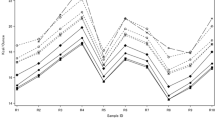Abstract
A NUMBER of experiments was conducted on the ewe to determine the role of lymph draining from the lactating mammary gland in the resolution of the milk constituents. Lymph flowed continuously for many weeks from a polyethylene catheter inserted into the main lymphatic duct draining the mammary gland. Initial investigations were concerned with the changes in composition of the lymph when the lamb was removed from its mother early in lactation. Plasma and lymph samples were collected at intervals for 7–14 days and the concentrations of free fatty acids, volatile fatty acids, cholesterol, phospholipid, total esterified fatty acids, protein, potassium, calcium and inorganic phosphate were measured. In addition, attempts were made to determine the presence of milk proteins in the lymph by the technique of specific precipitation in agar1 and also by electro-phoresis on cellulose acetate.
This is a preview of subscription content, access via your institution
Access options
Similar content being viewed by others
References
Mansi, W., J. Comp. Path., 67, 297 (1957).
Heyndrickx, G. V., and Peeters, G. J., Biochem. J., 75, 1 (1960).
Author information
Authors and Affiliations
Rights and permissions
About this article
Cite this article
LASCELLES, A. Removal of Milk Constituents from the Mammary Gland of the Ewe. Nature 191, 1404–1405 (1961). https://doi.org/10.1038/1911404a0
Issue Date:
DOI: https://doi.org/10.1038/1911404a0
Comments
By submitting a comment you agree to abide by our Terms and Community Guidelines. If you find something abusive or that does not comply with our terms or guidelines please flag it as inappropriate.



